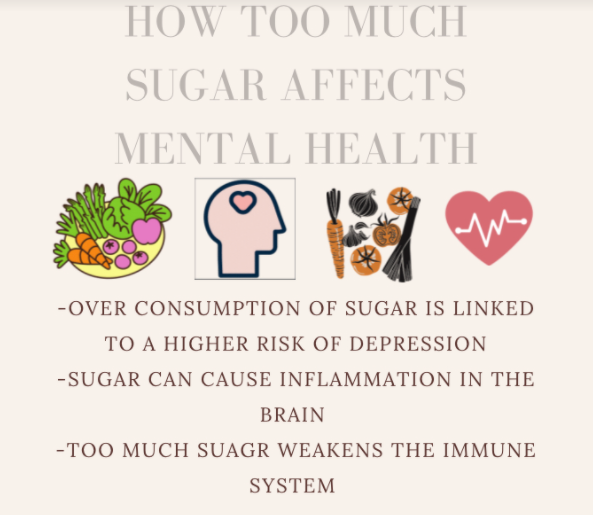Un-sugarcoat the effect of diet on mental health

Canva displaying facts about overconsumption of sugar.
April 6, 2022
Millions of Americans suffer from the physical and mental side effects of sugar overconsumption without even knowing it. For many, a positive shift in mood and daily performance can be achieved by limiting sugar intake.
Of course, sugar is an important part of anyone’s diet, humans need it to survive. However, a surplus in sugar has been linked to not only physical decline, but cognitive decline as well. Sugar releases dopamine in the brain, making sugar extremely addictive, as well as triggering imbalances in the brain.
According to a study done by the University of College London, “Men and women with mood disorders and high sugar consumption also had an increased chance of being depressed again after five years compared to those with lower intakes.”
Excess sugar in the body can also lead to detrimental physical effects by causing inflammation in the brain. Sugar is a main culprit in speeding up the aging process.
According to Healthline, “…[inflammation] can accelerate the biological aging process and worsen age-related diseases, including vascular conditions.”
An excess of sugar in the body also leads to a weakened immune system, and in a time where everyone is more health conscious than ever, this can be very dangerous.
Atkins says, “Bacteria and yeast feed on sugar, so excess glucose in the body causes these organisms to build up and cause infections.”
Many people think that at the first sign of a health condition, a person should immediately see a doctor and get on medication. While it is important to speak to a doctor or professional as soon as one sees signs of possible health conditions, receiving medication is not the only option out there.
Overall, a balanced diet and good gut health should be a priority in everyone’s lives. Sticking to the recommended sugar intake of 24 grams per day for women and 36 grams for men is the fundamental piece for good health.

